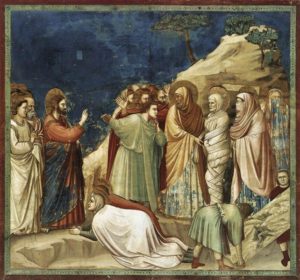“Jesus wept.”
 There is a rather sharp contrast between the joy we celebrated last Sunday as the Church heeded the King’s command to rejoice and the very somber verse cited from the Gospel of this Sunday. “Jesus wept” is the shortest verse in the English Bible, but in that so short verse is contained one of the most profound insights into the very Sacred Heart of Jesus Himself. Why did He weep? The Jewish onlookers speculated that He was weeping because He missed Lazarus. This obviously makes no sense, as the King of Kings knew that He was about to raise Lazarus from the dead. What sense would it make to be missing someone so much that it brings you to tears when you know you are going to see him momentarily?
There is a rather sharp contrast between the joy we celebrated last Sunday as the Church heeded the King’s command to rejoice and the very somber verse cited from the Gospel of this Sunday. “Jesus wept” is the shortest verse in the English Bible, but in that so short verse is contained one of the most profound insights into the very Sacred Heart of Jesus Himself. Why did He weep? The Jewish onlookers speculated that He was weeping because He missed Lazarus. This obviously makes no sense, as the King of Kings knew that He was about to raise Lazarus from the dead. What sense would it make to be missing someone so much that it brings you to tears when you know you are going to see him momentarily?
The key to understanding what is happening in His Heart is revealed a few verses earlier, when the Gospel notes that Jesus saw Mary weeping. This caused His weeping. The King of Kings and Lord of Lords, Who holds the Universe in the palm of His hand, chooses to join her in her sorrow and weep with her. This is the ultimate act of sympathy, of compassion. Both of those words, one from a Greek base and the other from a Latin base, mean exactly the same thing: “to suffer with.” Jesus chose to honor her sorrow and share it with her, taking that moment to manifest, even to the onlookers, how His Heart was there for her.
This so poignantly demonstrates how His Heart is also there for us, present for us, even to the extent of sharing our griefs. He could have told her, “Stop crying, he’s coming back any second now! But He didn’t. He stopped and shared her sorrows. The amazing and constant proximity of the Lord to us is demonstrated so clearly here. There are times when we may feel like He is absent or even like He doesn’t care. One of the most eloquent responses to that lie from the snake was in one of the Scriptures that we heard at daily Mass last week, when the complaint was issued that He had forgotten us: “But Zion said, “The LORD has forsaken me; my Lord has forgotten me.” In response to that, it was proclaimed, “Can a mother forget her infant, be without tenderess for the child of her womb? Even should she forget, I will never forget you.” (Is. 49:14-15). Of the many relationships present among people, probably none is as intimate and caring as that of a mother for her infant. Yet, it is proclaimed that it would be easier for the mother to forget that child of her womb than for the Holy One of Israel to forget His People! The New American Bible in translating Is. 49:14 simply mentions the infant with the mother, but the Revised Standard more accurately describes the situation: “Can a woman forget her sucking child?” How could a mother forget the very child she was actually nursing?
The Holy One uses these amazingly intimate descriptions to let the Chosen People, and us, know that He is always with us, that He is closer to us than the most intimate relationships of care that human beings can experience. The way that the Scriptures record the Lord Jesus being so present to Mary is not meant to simply let us know about a historical fact in the relationship between her and the Lord Jesus. It is meant to convey to us the level of intimacy and proximity that the Lord Himself takes to each one of us, especially during times of particular grief and sorrow. He is always present, and He always cares! Though at times the experience of His presence seems distant to us, we always need to recall that our emotional experience at a particular time, especially a time of great difficulty, is not a reliable indicator of His presence! Because the reality is that He is always present to us and He always cares! He loves us and wants to share our hearts just as much as He loved Mary and chose to share her heart. Especially in times of trial and burden, we need to come to Him, because even when He seems to be absent or unaware, like the disciples feared when He was asleep in the boat and they seemed to be sinking, as they discovered, He is always present and He always cares!
– Fr: Ed Fride
Read More from Fr. Ed Fride
Third Sunday of Easter, 2022
“I will praise You, Lord, for You have rescued me.” The great Octave of Easter concluded with Divine Mercy Sunday, one of Pope St. John Paul the Great’s many gifts to the Church. During these last few weeks we have been graphically reminded of the gifts to us of the Eucharistic Lord, of the ... Read more

